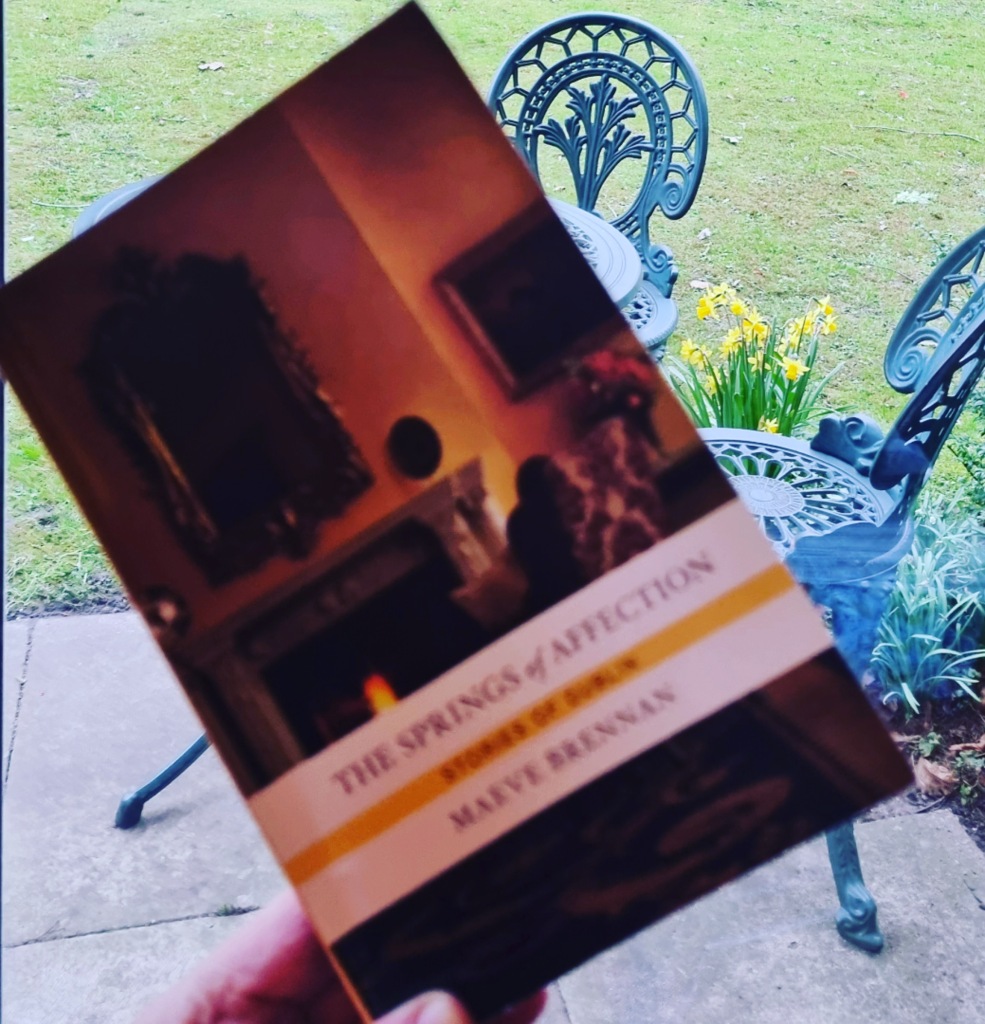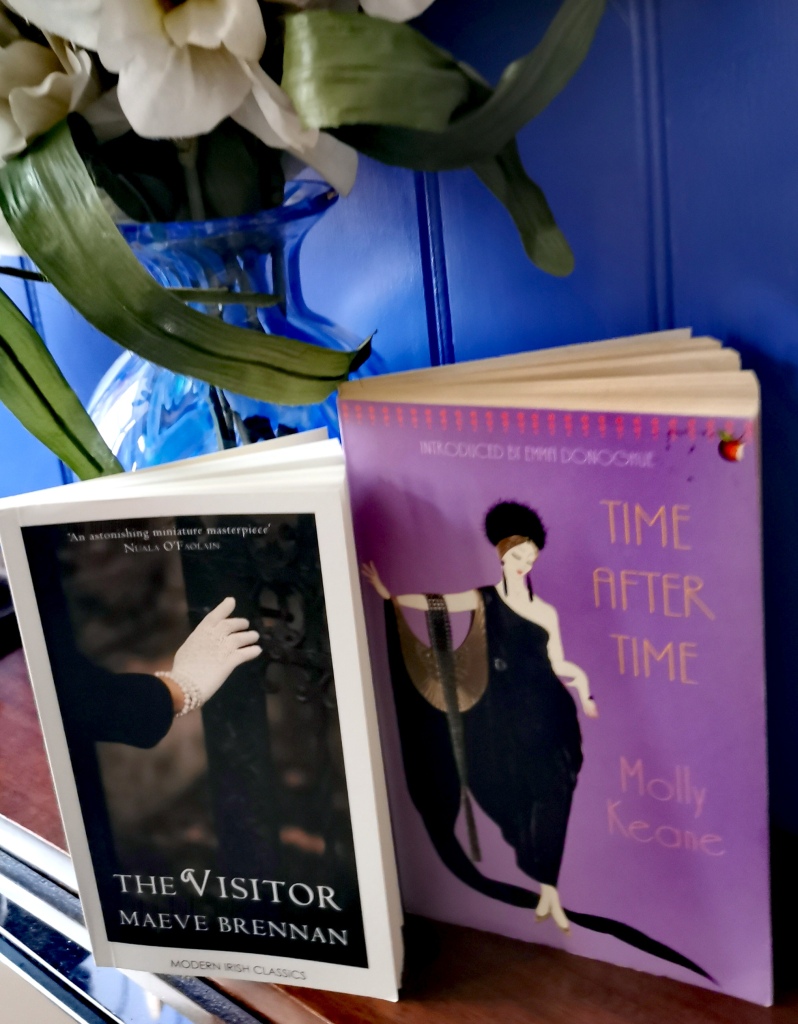It was the reviews of other bloggers that first pointed me in the direction of Maeve Brennan, and I read her slim novella The Visitor for reading Ireland month last year. Luckily for me Jacqui from Jacquiwine’s journal found she had two copies of The Springs of Affection and sent me her spare. A large collection of short stories – possibly one of the best collections I have read. It is a fairly large format paperback – and over 350 pages, which feels long for a story collection, however it certainly isn’t too long, it is simply glorious.
The stories gathered here are the very best from one of The New Yorker’s most celebrated writers. All but three of the stories in this collection were first published in The New Yorker between 1954 and 1981. Divided into three sections, this collection explores three different Dublin families. Here we see all the different kinds of love between people, and how sometimes that love fades, twists, or turns sour.
The first seven stories are autobiographical, stories of Maeve and her siblings growing up. These stories are all quite short, and I longed for more of them. Although not a huge amount happens here, they are simply perfect. There is gossip and excitement after a large fire at the shop round the corner from Maeve’s house. An old man comes to the door selling apples, after which it is hard to get rid of him. The most notable event from a story called The Day We Got Our Own Back – a group of plainclothes men carrying revolvers ransack the small suburban house where Maeve lived, looking for her father. At the time (1920s) Maeve’s father was for the Republic but against the Irish free state, and was on the run because of his beliefs. Nothing terrible occurs, Maeve and her siblings are surrounded by love, good sense and what looks like happiness. In The Lie she recalls the time she began to make her confession, and the lie she told her mother and how the penance she received from the priest gave her away.
The second set of stories feature Mr and Mrs Derdon. Rose and Hubert are a middle aged couple when we first meet them in the story A Young Girl Can Spoil her Chances. It is the forty-third anniversary of Mrs Derdon’s father’s death – she was just ten when he died – and she is going out early to have a mass said for him. Therefore Mr Derdon must breakfast alone, and he is resentful, sulking upstairs until he thinks he hears her leave the house.
“Hubert knew that look. She only wore it outside the house. Hubert disliked having the order of his day disturbed. He didn’t like to have his breakfast all topsy-turvy, and he didn’t like seeing his wife running around the house at that early hour of a weekday morning with her hat and her gloves on, and her big bulging prayer book in her hand, but what he disliked most of all was to see her go out to face the world wearing the face that she showed to the world, the face she imagined impressed people – as if anybody ever noticed her.”
Immediately from this story we get a sense of this marriage. The stories of Rose and Hubert don’t all run chronologically, some acting almost like a flashback moment to an earlier time in their lives. In one of my favourite stories A Free Choice we see Rose and Hubert as a young couple, they aren’t even officially courting yet, though Hubert has been visiting her at home with a view to making it more official between them. They are at a dance at Mrs Ramsey’s, Rose’s father had worked at Ramsey’s shop, had made the curtains that hang in the room where Rose finds herself stood watching the dancers. She remembers him telling her about the curtains. In this story we see the beginning of the relationship, and it’s not auspicious, Rose has had her head turned by another young man, who dances with her then leaves her stranded in the middle of the room. Hubert comes along at just the right moment.
There is so much unspoken pain and misunderstanding in this relationship, it feels quite suffocating and Brennan portrays these people perfectly. Rose and Hubert have a son, John, who left home for the priesthood, there is even resentment here, Hubert jealous of the love Rose has for her son, John suffocated by it. Each of them try in small ways to deceive the other, not very well, there is a cool anger and small petty hatreds in these stories. Even when one of them dies, the other is unable to grieve.
The third section of stories are about another family. The Bagots; Delia, and her husband Martin and their two daughters, there was a baby son who died, from which Delia has never recovered. Delia’s whole life is wrapped around her children and the pets she insists on having but that her husband hates. Martin has begun sleeping in the small spare room, ostensibly because he always comes home very late, often in the early hours, but what started out as a practical solution has simply turned into the norm. These are gentler stories, stories of domesticity – the opening story, The Twelfth Wedding Anniversary Delia gathers flowers for Martin’s room, arranging them in a glass bowl. Martin hasn’t forgotten the anniversary, but is resistant to acknowledging it. He feels encumbered by his family. In other stories we see Delia’s pride in a carpet decorated with pink roses, she beats and brushes it outside. In another story a new sofa is delivered, and there is all the excitement and anxiety a big purchase like this has for us all. Still there is a lot to remind us of Rose and Hubert, as this is another unhappy marriage by most people’s standards. In The Shadow of Kindness, the children go away on holiday without Delia, to stay with an aunt. Delia is instantly lost without them.
“Martin had given up sleeping in the big front bedroom, because she and the children got up early and disturbed him, moving about, and now he slept in the small room next to the bathroom, on the landing halfway up the stairs. Lately she had been hoping he would say something to her that would give them both a chance to talk, but he had said nothing. She knew things were not how they should be between them, but while the children were at home she did not want to say anything for fear of a row that might frighten the children, and now the children were away she found she was afraid to speak for fear of disturbing a silence that might, if broken, reveal any number of things that she did not want to see and that she was sure he did not want to see.”
The final story, The Springs of Affection – is deliciously sharp. Both Delia and Martin are dead. Martin’s twin sister Min, an elderly woman herself kept house for Martin after his wife’s death. Min has now brought as much of the contents of Delia and Martin’s house as she can back to her home in Wexford. She hated Delia passionately, she never forgave Martin for leaving their happy family home and getting married. She slipped the wedding ring from his dead hand as he lay in his coffin and now wears it on her own.
This is an incredible collection, which could almost be read as three novellas.








